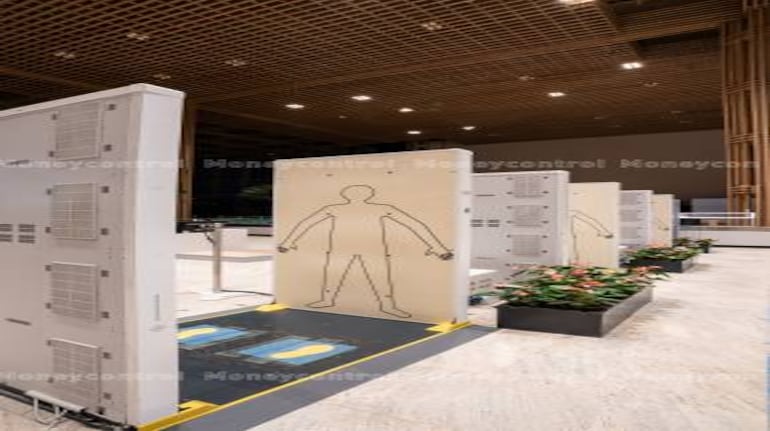
BIAL officials said three full-body scanners have been installed at T2
Passengers using Terminal 2 (T2) of Bengaluru’s Kempegowda International Airport (KIA) will soon no longer need to remove personal electronic devices, like mobile phones and laptops, from handbags at pre-embarkation security checkpoints.
Bengaluru International Airport Limited (BIAL), the operator of KIA, said that a trial run for the CTX (Computer Tomography X-ray) machine at T2 will commence within the next few weeks. To begin with, the new system is meant only for domestic passengers, and is likely to be operational in December 2023.
“The trial run for the CTX machine at T2 will begin within the next few weeks,” Satyaki Raghunath, Chief Operating Officer of BIAL, told Moneycontrol
“KIA will be the first airport in India to begin passenger trials for the CTX machine, which will be integrated with the Automatic Tray Retrieval System (ATRS) and full-body scanners,” he said.
BIAL officials said three full-body scanners have been installed at T2 for a faster and more secure flying experience.
Also read: AAI receives clearance: Full-body scanners set to upgrade airport security
How will the new system work?
“Operators can rotate the view to look at the contents of bags, cutting down on re-checks and physical inspection. Also, the new system will reduce the number of trays required per person during security screening,” Raghunath said.
“This means passengers will be able to leave their electronic items (laptops, etc.) and LAGs (liquids, aerosols, and gels) in their bags and go through a quicker screening process. It will also reduce processing time at security checkpoints. Removing fewer items from luggage means fewer trays, speeding up divesting and reducing contact points, thus improving hygiene,” he said.

It will also eliminate the current process of patting down passengers, after a primary screening through the walk-through metal detector.
“The CTX Proof of Concept (POC) is undergoing trial at T2. The installation and integration with ATRS lanes are currently underway, and trials on passengers will begin very soon,” said Raghunath.
“Advanced screening of carry-on baggage using CT and automatic explosives detection algorithms will improve security outcomes with superior 3D image quality, and CT can better identify the density of liquids,” he added.
T2, known as a ‘terminal in a garden,’ was inaugurated by Prime Minister Narendra Modi in November 2022, with a construction cost of around Rs 5,000 crore. It began domestic operations on January 15, 2023. International flight operations at T2 commenced on September 12.
While Terminal 1 (T1) caters to domestic flights, including Akasa Air, Alliance Air, IndiGo (domestic) and SpiceJet, Terminal 2 is dedicated exclusively to international carriers, along with domestic flights of AirAsia, Air India, Star Air, and Vistara.
Also read: International operations commence from Bengaluru airport’s T2
What’s the scene at other airports?
While Delhi airport has conducted CTX trials, it is yet to carry out passenger trials for the CTX machine, integrated with ATRS and full-body scanners.
A spokesperson for Delhi International Airport Limited (DIAL) stated, “CTX trials were conducted at IGIA in Terminal 2 from February 2023 to May 2023. Based on the trials, feedback is now awaited from stakeholders.” Currently, the IGI Airport does not have full-body scanners. “CT & FBS are under procurement. Trials for CTX were also conducted at Mumbai and Bengaluru airports” said a DIAL spokesperson.
“The major advantages of the facility are passenger convenience, enhanced security screening, ease of screening/identification of threat articles, smoother passenger transit, and faster security screening,” the DIAL spokesperson added.
Also read: Seven airports will have to install CT X-Ray machines by end of this year
The Bureau of Civil Aviation Security (BCAS) had ordered all major airports handling 50 lakh passengers to install 3D CTX machines for cabin checks by the year-end, but most operators are likely to miss the deadline.
